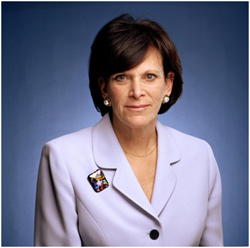 In the 14 years that Jessica T. Mathews has been at the helm of the Carnegie Endowment for International Peace, she has had an enormous impact on the world of international affairs.
In the 14 years that Jessica T. Mathews has been at the helm of the Carnegie Endowment for International Peace, she has had an enormous impact on the world of international affairs.
In 2006, she laid out a vision of transforming the Carnegie Endowment – America's oldest foreign policy think tank – into the world's first global think tank. The result is an intellectual organization with an American base, not an American organization with foreign branches.
Today, in addition to its Washington, D.C., headquarters, Carnegie has full-fledged research institutions in Moscow, Beijing, Beirut and Brussels. A new center is expected to open in India in 2013, and a new program for Central Asia has been established in Kazakhstan.
The Endowment runs websites in Arabic, Chinese and Russian as well as English. In Moscow, there are more than 40 Russians on the staff and one American. In Beirut and Brussels, the staffers are entirely Middle Eastern and European, respectively. In the 2011 think tank rankings by the University of Pennsylvania, every center was ranked in the top category for its region – a feat unmatched by any other institution.
This marks the second year that the Frank Batten School of Leadership and Public Policy has led the selection process for the citizen leadership medal, which was established in 2007.
"The medal honors private citizens who have exercised leadership in the public arena in a non-governmental capacity," Dean Harry Harding said. "One of the most important ways they can do so is through America's vibrant network of organizations that engage in research and advocacy on various areas of public policy."
Mathews, he said, has advanced the Carnegie's reputation for objective, influential, non-partisan analysis that provides insight into emerging transnational issues and explores collaborative solutions. "Many of the students and faculty at the Batten School share an interest in those issues," he said.
Before joining the Carnegie Endowment in 1997, Mathews worked in both the executive and legislative branches of government, in management and research in the nonprofit arena, and in journalism and science policy.
Mathews, 65, was born in New York City, the daughter of renowned historian Barbara Tuchman and Lester Tuchman, a researcher and professor of medicine. She holds a bachelor of arts from Radcliffe College and a Ph.D. in molecular biology from the California Institute of Technology.
She turned toward public policy during a one-year science fellowship in the office of U.S. Rep. Morris K. Udall. During that year, Udall began considering a run for the presidency, and Mathews wrote memos on campaign issues, from busing to amnesty to import tariffs. When Udall decided to run, she stayed on. "The long and short of it was that I never got back to the lab," she said.
From 1977 to 1979, she was director of the Office of Global Issues at the National Security Council, covering nuclear proliferation, conventional arms sales and human rights. As a member of the Washington Post's editorial board from 1980 to 1982, she wrote about such topics as arms control, energy, environment, science and technology. Later, Mathews wrote a popular weekly column for the Washington Post, which circulated nationwide and in the International Herald Tribune.